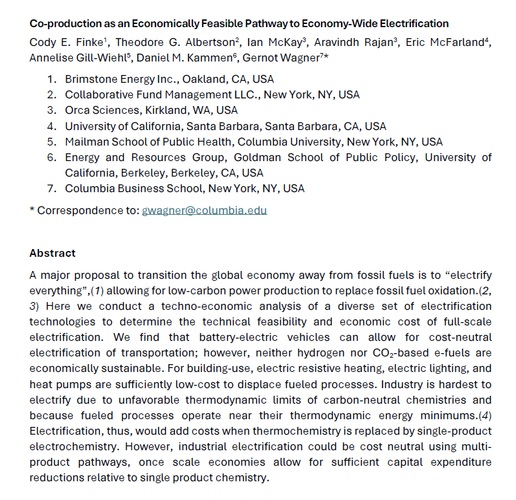Deutsche Welle: "Can we afford a transition to clean energy?"
by Charli Shield & Sam Baker
Charli: Energy strategists like Kingsmill Bond from the UK-based energy thinktank Ember, which tracks data and policy on the global clean energy transition. And climate economists like Gernot Wagner, from the Columbia Business School in New York.
Gernot Wagner: Solar PV - cheapest source of electricity in history. This stuff is so cheap by now that Germans are installing it as garden fencing. Literally! Not the best place to put your panel. It’s a solar panel, it keeps the dog in, and the car charged – why not use it as a garden fence? So that’s where we are and it’s only going to get cheaper.
Charli: Affordable battery storage is key. It’ll mean households and businesses can store their power for use when the sun isn’t shining and the wind isn’t blowing and take pressure off of electricity grids. And this brings us to the second reason clean energy will be cheaper in the long run – because the technology for it keeps improving.
Gernot: Coal prices have basically been constant, inflation-adjusted for around 200 years. The electricity generated from coal hasn't gone up in price, it hasn't come down either.
Charli: That’s climate economist Gernot Wagner again.
Gernot: Solar PV is a technology which gets better and cheaper over time, whereas coal is a commodity. It's only going to fluctuate. Coal, gas, oil are all commodities. Their prices are fluctuating. And by the way, that fluctuation is bad, too. That's where Putin blows a fuse, invades Ukraine, fossil prices spike, gas prices 10x in Europe. And we have the summer of 2022 when electricity prices in Europe were 10 times as high as they should have been. That is fossil-flation. That's inflation caused by fossil fuel prices fluctuating. Solar PV, wind, hydro, geothermal, low carbon technologies don't have that problem. Those technologies can only get cheaper and better over time.
Charli: So, yes, building the clean energy system takes investment. But not more than we’re currently spending on the dirty system, and the long-term payoff is cheaper, cleaner, more secure energy, for everyone.
Charli: That last point he makes gets to the heart of the challenge here – which is that, yes, clean energy technology may be cheaper than ever, and for all the reasons outlined in this series certainly cheaper than a fossil fuel-based system, but a lot of the transition still hinges on policies and government decisions. According to Gernot, it’ll take more than just cheap technology.
Gernot: You and I as consumers don't care where our steel comes from. Don't care where our cement comes from. Right? We're not going to pay more for steel. We're not going to pay more for cement, unless there's policy that frankly forces the companies to produce cleaner steel, makes the clean relatively cheap compared to the dirty. So it's not going to be corporate volunteerism that will guide us in the right direction. Of course it takes policy overall to guide society, the economy, and businesses in the right direction.
Audio clip: "Can we afford a transition to clean energy?"

